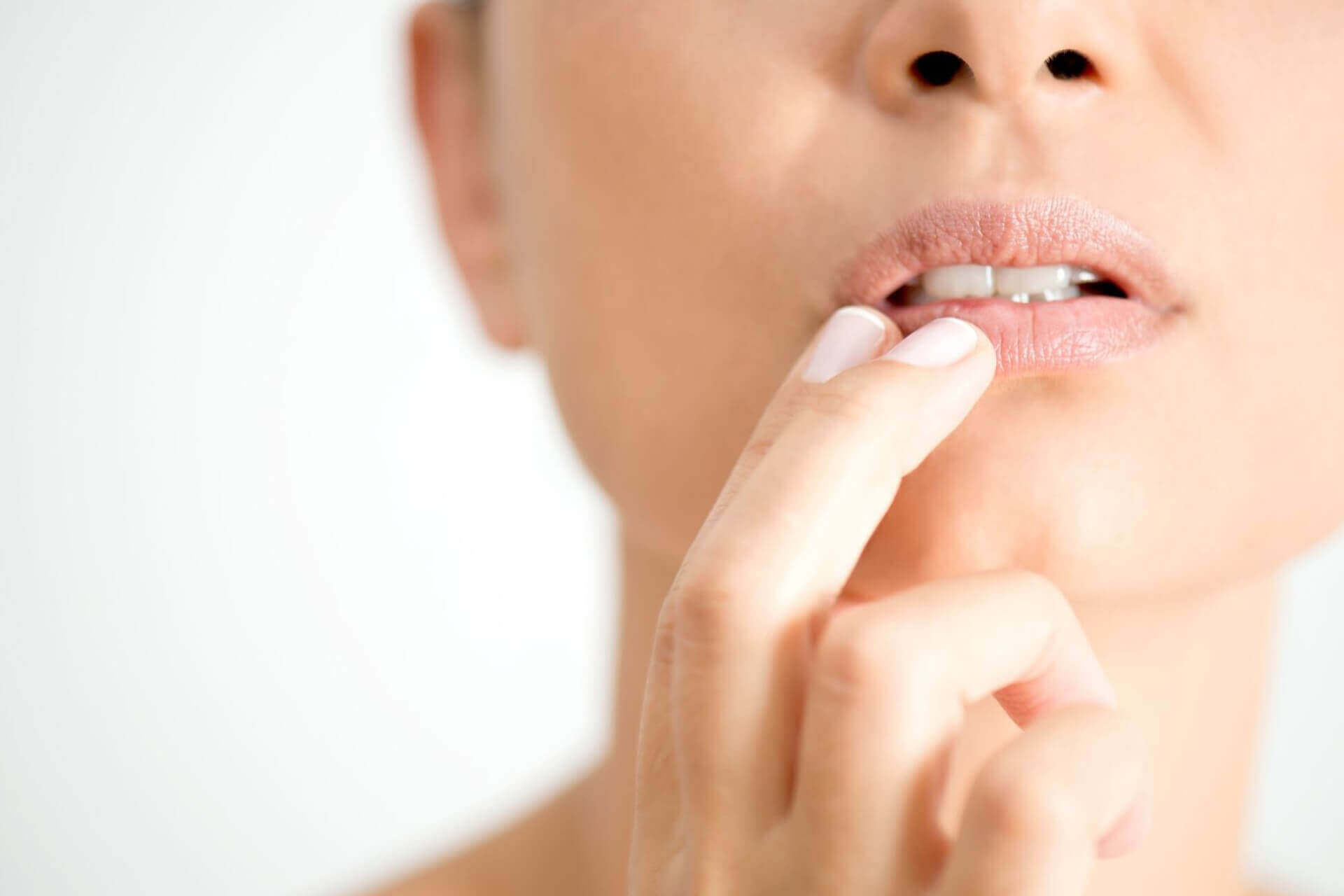If you suffer from cold sores, you’ll know just how uncomfortable they can be! But what are they, and how can we get rid of them? Here, we’re taking a look at what causes cold sores, their symptoms, and how we can help treat them.
What Is a Cold Sore?
Although cold sores are extremely common, many people may not know that they are caused by a virus called Herpes Simplex Virus (HSV for short). There are two different types of HSV, both of which can cause cold sores. Type 1 is thought to be responsible for more than 90% of cold sores, whilst Type 2 generally causes genital herpes but it can also cause cold sores if it infects the skin around the mouth.
HSV is highly contagious and is spread through skin-to-skin contact. Unfortunately, there is no cure for HSV just yet, so if you have had one cold sore, it’s likely that you will have more. This is because the virus that caused the first cold sore will lie dormant in the nerve cells in that area of your skin (usually around the lips). This means that it can potentially cause infection again in the future. It also means that you’re likely to experience cold sores in the same spot during each flare-up.
What Are the Most Common Symptoms?
Now that we know what causes cold sores, let’s take a closer look at the symptoms. Generally speaking, they appear as small blisters on the skin, and they can be quite itchy or painful. Cold sores on the lip are perhaps the most common, but cold sores on the nose and cheeks are not uncommon. How long do cold sores last? They tend to take 7-10 days to heal on their own.
There are some tell-tale signs that a cold sore is brewing which can help you catch it early and start treating it. Here are the most common symptoms:
- A tingling or itching sensation around the lip
- Redness or swelling that may look like a pimple starting to form
- Throbbing, soreness, or a burning sensation around the lip
As we mentioned before, cold sores tend to pop up in the same spot each time. Therefore, if you experience any of these tell-tale signs in that particular spot, it can be a strong indication that one is on the way.
What Causes a Cold Sore Flare-Up?
Cold sores can reappear at any stage, once you have already been infected with HSV. However, certain situations may trigger a flare-up of symptoms. Some of the most common triggers are:
- Feeling unwell with a viral infection or a fever
- Stress
- Fatigue
- Hormonal changes, such as the start of your period
- Changes to the immune system
- Dry, chapped or irritated lips
- Exposure to sunlight and wind
Prevention is always better than cure, especially when it comes to cold sores. That’s why we suggest getting to know your triggers and avoiding them. For instance, you may notice that you tend to get cold sores when you’re feeling stressed. In this case, you should invest some time into learning stress management techniques. Or, if exposure to sunlight is a trigger for you, you may want to increase your SPF factor.
How Do You Stop a Cold Sore From Spreading?
As we mentioned before, cold sores are extremely contagious, but there are some very simple things that you can do to avoid spreading the virus to other areas of your body or to your loved ones.
- Try not to touch or pick blisters/sores.
- Avoid skin-to-skin contact, such as kissing and oral sex.
- Avoid sharing items that have come into contact with the cold sore: Don’t share water bottles, eating utensils, towels, lip balms etc.
- Wash your hands immediately after applying cold sore cream or touching the blister/lesion.
Whilst HSV infections can cause discomfort, they do not usually cause any serious health conditions. However, it is worth noting the virus can potentially be very serious for people who have a weakened immune system (immunocompromised). Therefore, you should be especially careful not to pass on the virus.
Similarly, you should be extremely cautious around babies and young children, if you have an active cold sore. This is because babies and young children are at risk of neonatal herpes, a potentially life-threatening condition. Thus, you should never kiss babies or young children when you have a cold sore.
How to Get Rid of Cold Sores
Although there is no cure to get rid of them permanently, there are antiviral medications that can help ease symptoms and clear flare-ups faster. Here at Webdoctor.ie, we can provide patients with a prescription for an antiviral medication called Aciclovir. You can use this medication to reduce the severity and duration of each outbreak by preventing the virus from multiplying. It can also help reduce the spread of the virus.
In addition, there are some ways you can help ease discomfort:
- Apply a compress: a cold, damp cloth can help reduce redness and swelling whilst a warm compress can help ease the pain caused by blisters.
- Pain relievers: Cold sores can be painful and over-the-counter pain relief can help.
Using Aciclovir as a Cold Sore Treatment
Aciclovir is very easy to use – simply take one tablet, five times a day, for five days. You should try to space out doses throughout the day (don’t worry, you don’t need to take it during sleeping hours). Remembering to take a tablet at regular intervals can be tricky so we recommend setting alarms or reminders on your phone so you don’t miss a dose. If you do happen to miss a tablet, just take it as soon as you remember and continue as before; you don’t need to take two doses together to make up for the missed dose.
You should always complete the entire course of medication, even if your symptoms have disappeared. This helps prevent another flare-up. As your skin is healing, it will be more sensitive to sunlight, so we recommend avoiding strong sun and sunbeds. As we know, we should be wearing factor 30 SPF each day, but you may want to reach for a higher factor for extra protection. We also recommend refilling your water bottle more often. Staying hydrated is key to supporting healthy skin and kidneys.
Aciclovir should only be used if you have been diagnosed with cold sores by a healthcare professional previously. If you have not, you should see a doctor face-to-face via video consultation.
How to Order a Prescription for Aciclovir
Ordering a prescription for Aciclovir couldn’t be easier. All you have to do is fill out a brief questionnaire, describing your symptoms. Then, one of our Irish-registered doctors will review your information and send your prescription to your pharmacy within minutes of approval. To do this, we use secure Healthmail and we guarantee the same doctor-patient confidentiality as regular GP consultations.
If you have any questions about prescription cold sore treatments or you would like to discuss treatment in more detail, simply book an online consultation with one of our doctors. There, we can talk you through the treatment and answer any questions that you may have.





